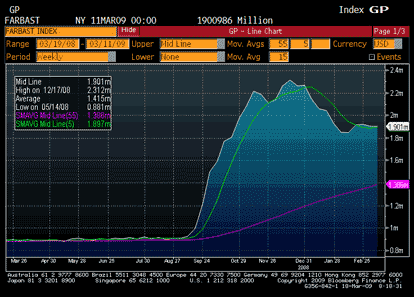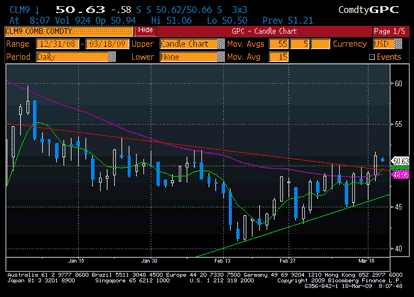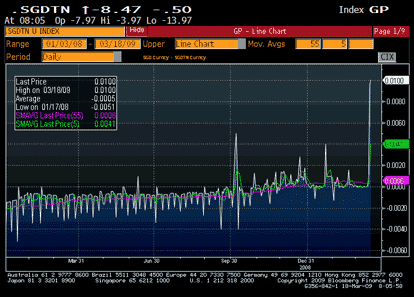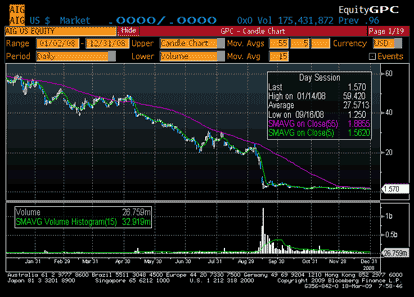Contrary to Macro Man’s expectations, equities put in a very good day yesterday, with the SPX breaking and closing above the 767 level. Perhaps the feel-good was stoked by the unexpected rise in housing starts; if so, Macro Man remains sceptical, as that data is a rather flimsy foundation for a recovery.
Perhaps, also, the rally was stoked by a belief that the Fed will do something at tonight’s meeting. Certainly, the Fed has lost its leadership in the global easing league table. While Bernanke has long been touted as an expert on the Great Depression, and the Fed was the first CB to publicly contemplate quantitative easing in this cycle, they’ve basically done nothing for several months. (OK, they’ve been preparing for the TALF, but hey- what have you done for me lately?)
As a consequence, the growth of the Fed’s balance sheet has stalled. In the meantime, the BOE, SNB, Bank of Israel, and BOJ have all embraced some form of QE. So is the Fed going to bring shock and awe tonight, or is Bernanke going to do nothing, sit there like a deer caught in the headlights, and pray like hell that the TALF works where every other Fed program has failed? If the latter, equities may face their sternest test of the “recovery”.
Nevertheless, markets clearly seem to “want” to trade this recovery. The few equity longs of Macro Man’s acquaintance are crowing, dollar bears are emerging, yawning, from their winter hibernation, and thousands of virtual trees have been killed with all the e-ink spilled about China’s incipient rebound.
And indeed, there are a few interesting-looking charts. Oil is trying its damnedest to break out; June WTI, pictured below, has driven through both trendline resistance and the 55-day moving average CTA trigger level. Frankly, Macro Man has more sympathy for this move than the equity bounce, as the long-term supply/demand dynamics of the energy market are considerably more bullish than those for equities.
Elsewhere, some of Macro Man’s sacred cows appear to be en route to the abattoir. He has long favoured playing SGD weakness, and it appears that he has quite a bit of company. There’s been quite a squeeze at the very short end of the SGD yield curve, with overnight rates trading as high as 55% yesterday. Ouch! The chart below, showing tom-next forward points, illustrates how unusual this is. Ultimately, this squeeze should prove cathartic ahead of next month’s MAS meeting. In the meantime, it’s just another indication that the pain trade takes no prisoners.
Finally, AIG. Macro Man has been alternately amused and bemused by the reaction to the AIG bonus disclosure. On the one hand, you have popular uproar, complete with buffoonish Congressmen grandstanding in front of the TV cameras. When a Senator starts advising people to commit suicide, that’s usually a pretty good sign that popular hysteria has taken hold.
On the other hand, you have community of financial market professionals, aghast that Congress could contemplate breaking the sanctity of an employment contract and comparing the AIG hearings to the McCarthy HUAC hearings. It’s surprising how many people seem unfamiliar with a concept that is part of daily life for members of small investment partnerships, namely netting risk.
Simply put, no matter how well an individual trader does, if the firm performs poorly and does not earn sufficient revenues to cover its expenses, you don’t get paid, regardless of whatever agreements you might have. It’s not pleasant and it might not be fair, but that’s life. (Disclaimer: Macro Man lived through three years of this early in the Noughties.)
Now under ordinary circumstances, employees of large firms don’t have to worry about netting risk. But it seems quite clear that these are not ordinary circumstances. One argument put forward by finance pros to justify the payouts is that AIG needs to retain key staff to maximize shareholder (e.g., taxpayer) value moving forwards.
Two thoughts come to mind on this one. The first is that cash bonuses are no guarantee that staff will stay; Macro Man knows that if it were him, he’d be looking to get the hell out of Dodge the moment the bonus hit the bank account.
The second is a quote from legendary baseball GM Branch Rickey, informing the star player (Ralph Kiner) of a woeful Pittsburgh Pirates team that he was on the trading block: “We finished last with you, we can finish last without you.” Well, AIG lost $66 billion last quarter with these invaluable staff members; it seems reasonable to expect that they could achieve a similar result without them.
All of this makes Macro Man appear to occupy a place of the political spectrum further to the left than his usual ideological residence. So to put things right, he has a compromise, market-based solution. Don’t seize the bonuses via a one-off excise tax. Instead, pay them in the amounts contractually-mandated, and use normal tax treatment. But pay them in stock, and allocate shares on the basis of the average AIG share price in 2008: $27.57.
So someone receiving a million-dollar bonus will receive 36,269 shares of AIG. Current market value: $34,818. This should appease the baying masses and also introduce an incentive to these valuable employees to right the ship as quickly and successfully as possible. Oh, and at the same time, introduce these guys to another concept well-known to hedge fund types: the high water mark.
If and when AIG were ever to surpass the high water mark of the stock allocation price, that would be a very big day indeed, for both the employees and the taxpayer.







Leave a Reply